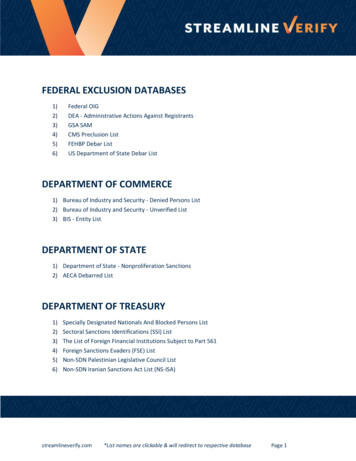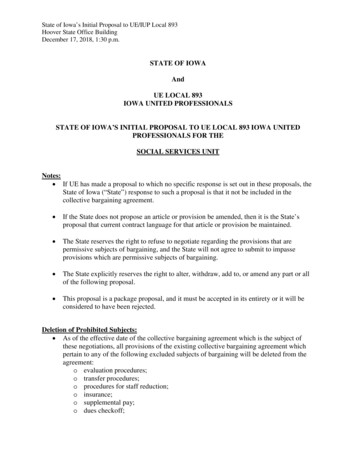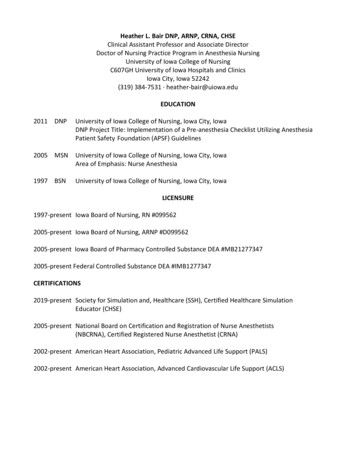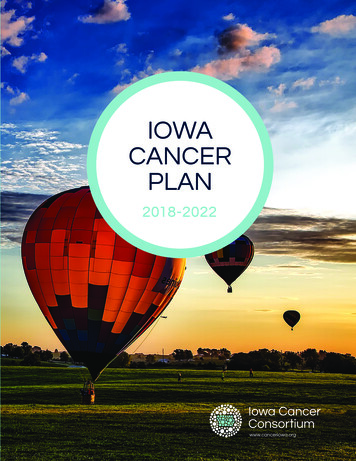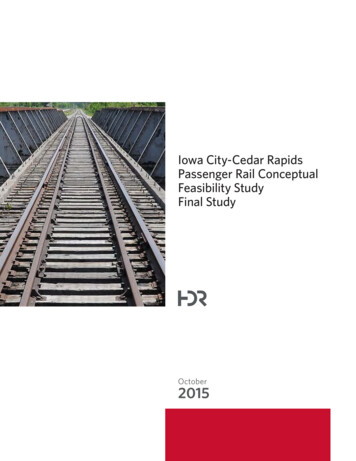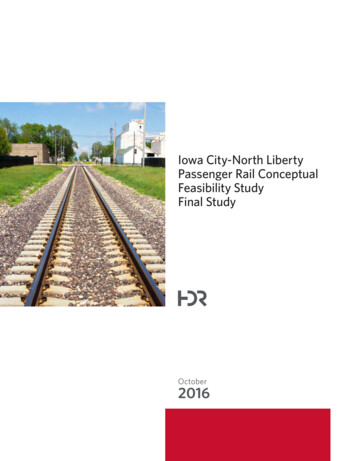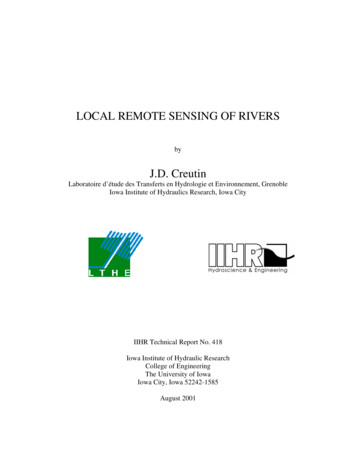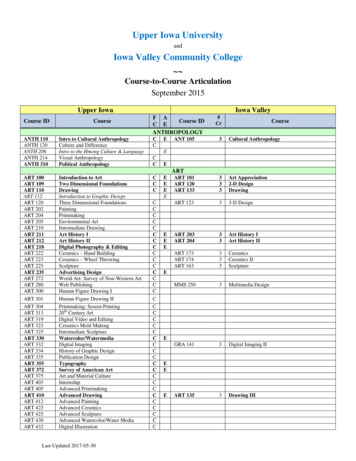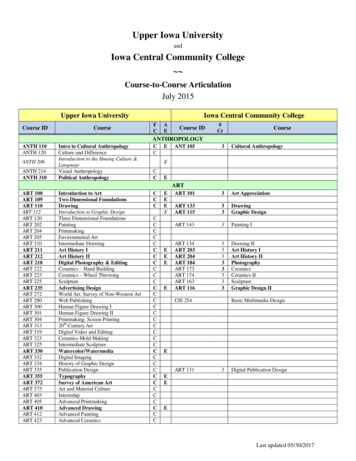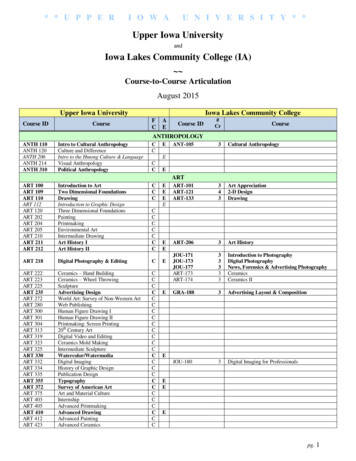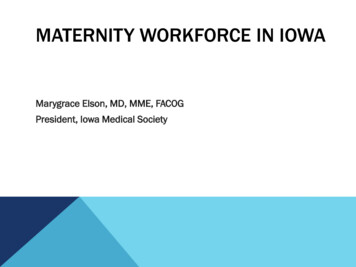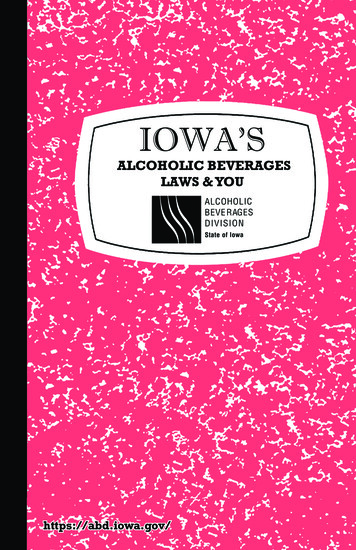
Transcription
IOWA’SALCOHOLIC BEVERAGESLAWS & YOUhttps://abd.iowa.gov/
Iowa Program for AlcoholCompliance TrainingI-PACT.comDate of CompletionIowa Pledge OnlineCertification Programfor Tobacco Compliancehttps://abd.iowa.gov/Date of CompletionI-ALERT, Under 21Can’t Be DoneIAlert.Iowa.govDate of Completion2
IOWA’SALCOHOLICBEVERAGES LAWSAND YOUA LICENSEE’S GUIDE TOCOMPLIANCE WITHIOWA’S ALCOHOLICBEVERAGES LAWS2016 Edition3
TABLE OF CONTENTSIntroduction. 6Laws & Regulations. 8Minors and Alcoholic Beverages.9Iowa Program for Alcohol Compliance Training.11Identification Information.11Intoxication.14Prohibited Practices.17Hours and Alcoholic Beverages.19Laws Important to Operating the Business.20Keg Registration.21Home Delivery of Alcoholic Beverages.22Social Gambling.24The Licensed Premises.25Trafficking of Alcoholic Beverages.28Promoting Alcoholic Beverages.32Product Information.33Penalties. 36Criminal Convictions.36Administrative Sanctions.37Civil Liability.39Administrative Hearings. 40Contested Case Hearings.40Appeal Hearings.43License Information. 48Licensing Requirements.49Ownership Information.51Additional License Privileges.52Other Licenses Required.57Self Help Review. 58Questions.58Answers.754
Glossary. 63Appendices. 66Historical Highlights.66Alcoholic Beverages License Classifications.69Important Contact Information.72Iowa Alcoholic Beverages Division Map.74Index. 76Notes. 80Order Form. 83Quick References. 865
INTRODUCTIONIowa’s alcoholic beverages industry operates within the confines of acarefully cast partnership between the Iowa Alcoholic Beverages Division(Division), licensees and law enforcement officials. Close cooperationamong these three entities is essential for regulation and enforcement ofIowa’s alcoholic beverages laws in order to achieve compliance.This manual was developed to provide licensees (their employees andagents) with the information needed to protect the welfare and safetyof Iowans through compliance with laws addressing the manufacture,distribution and sale of alcoholic beverages.The Division recognizes that alcoholic beverages licensees arelegitimate business people who have the right to conduct their businessfree from government intervention. At the same time, the Divisionunderstands that alcohol misuse and abuse poses a serious threat tothe health, safety and welfare of Iowans. The public is best served bybalancing business needs with public safety needs.The alcoholic beverages industry is governed by local, state andfederal laws and regulations. By obtaining a license, alcoholic beverageslicensees assume the responsibility of complying with all local, state andfederal laws and regulations. Balancing the need to maintain a profitablebusiness with the legal and social responsibilities that protect the publicpresents a challenge to owners, managers and employees of licensedestablishments.Today, all businesses involved in the state’s alcoholic beveragesindustry are separately licensed by the Division under the three-tier systemto provide for the lawful trafficking of alcohol. Licensees’ understandingof the three-tier system, the Iowa Alcoholic Beverage Control Act andother important laws pertaining to the manufacture, distribution andsale of alcoholic beverages, is a critical element of operating a successfulalcoholic beverages related business in Iowa.Knowledge may be the least expensive insurance against theimposition of administrative civil penalties, license suspension orrevocation, criminal fines, and civil lawsuits. Licensees who understandthe laws and regulations, as well as realize that problems can occurand often be prevented, are usually also successful in their businessendeavors.The Division hopes that this manual will provide licensees (theiremployees and agents) with the information necessary for the responsiblesale of alcoholic beverages and will assist in their effort to:6
Comply with alcoholic beverages laws and regulations.Curb underage drinking and illegal use of alcoholic beverages.Support the responsible consumption of alcoholic beverages bypeople of legal drinking age.This manual will provide information for a general understandingof the laws and regulations governing the alcoholic beverages license.This manual is not intended to serve as a precise statement of the IowaAlcoholic Beverage Control Act, the Division’s administrative rules orother statutes. For further information, refer to Iowa Code chapter 123and 185 Iowa Administrative Code, or contact the Division, your local cityor county attorney, or the Iowa Department of Justice.The Iowa Alcoholic Beverage Control ActIowa Code chapter 123.1“This chapter shall be cited as the Iowa Alcoholic Beverage ControlAct, and shall be deemed an exercise of the police power of the state,for the protection of the welfare, health, peace, and morals and safety ofthe people of the state, and all its provisions shall be liberally construedfor the accomplishment of that purpose. It is declared to be public policythat the traffic in alcoholic liquors is so affected with public interest that itshould be regulated to the extent of prohibiting all traffic in them, exceptas provided in this chapter.”(Originally adopted in 1934 by a special session of the forty-fifthGeneral Assembly.)7
LAWS & REGULATIONSThis chapter presents licensees (their employees and agents) withstate laws and regulations pertaining to Iowa’s alcoholic beveragesindustry. Review of this chapter will help licensees understand:Iowa’s legal drinking age is 21 and sale-to-minor violations carryboth criminal penalties and administrative sanctions.Verifying a person’s age is a fundamental tenant of operating alicensed alcoholic beverages establishment in Iowa. Learn how to verifyage and identity, and how to confiscate altered and falsified IDs or IDsbelonging to another individual.The Iowa Program for Alcohol Compliance Training (I-PACT) isa free online certification program for on- and off-premises alcoholretailers and their employees. Learn Iowa laws and how to avoid illegalalcohol sales.Intoxication is at the root of many crimes and accidents. Learn tipsto detect visible signs of intoxication and more about the relationship ofalcohol consumption to blood alcohol concentration.Prohibited practices in licensed alcoholic beverages establishmentsinclude running tabs, refilling bottles, and allowing illegal or criminalactivities. Learn how to identify whether these activities are taking placein the licensed establishment.Hours of alcoholic beverages sales in Iowa are 6 AM to 2 AMMonday through Saturday. Learn what additional permits may beneeded for Sunday sales.Laws important to operating the business include local ordinances,on-premises record keeping, display of alcoholic beverages licenses andspecific age requirements for alcohol licensees (their employees andagents) who sell, serve and deliver alcohol.Keg registration is required for all sales of kegs to consumers. Learnabout the responsibilities of the licensee for keg registration.Home delivery of alcohol is legal in Iowa. Learn the legal hours ofdelivery, age for delivery, record keeping requirements and more.Social gambling on the licensed premises requires a social gamblinglicense. Find out which games of chance are permissible and which arespecifically prohibited.The licensed premises is specifically designated by an alcoholicbeverages license. Learn which laws govern the licensed premises, itsuse during prohibited hours of sale, and fire code and capacity limits.Trafficking of alcoholic beverages for resale by on- and off-premiseslicensees is specifically regulated under Iowa’s three-tier system8
(manufacturer to wholesaler to retailer). Learn who can sell whatalcoholic beverages, where alcoholic beverages may be stored and howthey may be transferred, delivered, disposed of or imported.Promoting alcoholic beverages through advertising and tastings ispermissible, with a few exceptions.Product information on alcoholic beverages can be confusing. Whatare alcoholic beverages? What about non-alcoholic beer? Learn how tomathematically convert proof, weight and volume.Minors and Alcoholic BeveragesIowa’s legal drinking ageIowa’s 21-year-old legal drinking age applies to everyone, includingpatrons, agents, employees and the licensee’s family members. Noexceptions!Licensees (their employees and agents) must exercise reasonablecare to assure that a person is of legal drinking age before selling orserving them an alcoholic beverage.Iowa Code sections 123.47 and 123.49Age to be in licensed establishmentsIowa law does not prohibit minors from being in licensedestablishments. However, licensees should check with their localauthority to determine if there is an ordinance governing minors inlicensed establishments. If the local authority has such an ordinance, theordinance applies.Iowa Code section 123.39 and 185 Iowa Administrative CodeCriminal penalties for sale-to-minor violationsWhen licensees (their employees and agents) sell, give or otherwisesupply an alcoholic beverage to someone under the legal drinkingage, the licensee, seller and server may be charged and convicted incriminal court. The criminal penalty imposed by the courts is a simplemisdemeanor, punishable by a fine ranging from 500 to 1,500,depending on whether the violation is committed by the licensee or ifthe violation is committed by the licensee’s employee or agent.Iowa Code section 123.509
Criminal penalties for minorsWhen a minor purchases or attempts to purchase an alcoholicbeverage, or has an alcoholic beverage in their control or possession,the minor may be charged or convicted in criminal court. Following arethe criminal penalties imposed by the courts for minors purchasing,attempting to purchase, controlling or possessing an alcoholic beverage: First violation – simple misdemeanor punishable by a 200 fine. Second violation – simple misdemeanor punishable by a fine of 500 and completion of a substance abuse evaluation, or thesuspension of motor vehicle operating privileges for up toone year. Third or subsequent violation – simple misdemeanor punishableby a fine of 500 and suspension of motor vehicle operatingprivileges for up to one year.The court has discretion to order community service work of anequivalent value to the fine imposed.When the violation is committed by a minor under age 18, thematter is handled by the juvenile court.Iowa Code section 123.47Administrative sanctions for sale-to-minor violationsAdministrative sanctions are separate from criminal penalties; bothmay be imposed. When licensees (their employees and agents) sell, giveor otherwise supply liquor, wine or beer to someone under the legaldrinking age, the following administrative sanctions will be imposedagainst the alcoholic beverages licensee: First violation or first violation within two years – 500 civilpenalty or 14-day license suspension. Second violation within two years – 30 day license suspensionand 1,500 civil penalty. Third violation in three years – 60 day license suspension and 1,500 civil penalty. Fourth violation in three years – revocation of the license.Administrative sanctions are automatic when there is a criminalconviction under Iowa Code section 123.49(2)(h). When there is nocriminal conviction, administrative sanctions are imposed through anadministrative hearing. Licensees may settle in lieu of an administrativehearing.Iowa Code sections 123.39, 123.49 and 123.5010
Iowa Program for Alcohol Compliance TrainingThe Iowa Program for Alcohol Compliance Training (I-PACT) is analcohol retailer training course for on- and off-premises licensees.The training is online and free of charge. I-PACT covers the AlcoholicBeverages Control Act (Iowa Code chapter 123), valid forms ofidentification, and how to spot altered and fake IDs. Participants willlearn techniques for preventing underage sales and sales to intoxicatedpatrons, refusing the sale of alcohol with minimum confrontation, andlegally confiscating an altered or fake ID. The training also includesregulations and tips for off-site delivery of alcohol.The overall goal of I-PACT is increased voluntary compliance withthe state’s alcohol laws through education and enforcement. Thecore objective of the program is to prevent illegal sales of alcohol byeducating alcohol sellers and increasing awareness of changes in Iowa’salcohol laws.The program asks that a PACT is made for: Iowa kids not to consume alcohol products. Iowa retailers not to sell alcohol to minors. Iowa licensees not to serve alcohol to patrons under 21. Iowa’s law enforcement to enforce alcohol laws.Establishments that choose to participate in the I-PACT training aregranted an affirmative defense, which may be used once in a four-yearperiod. A business may avoid civil prosecution if an alcohol sale-tominor violation occurs in their establishment. In order for the businessto take advantage of the affirmative defense, the employee guilty ofthe violation must have been I-PACT certified prior to the time theoffense occurred. However, the affirmative defense cannot be used ifthe employee sold to a minor under the age of 18. Only the business iseligible to avoid a civil penalty; the guilty employee will still be subject toa criminal fine and their I-PACT certification will be revoked.Visit I-PACT.com or https://abd.iowa.gov/ to take the training andget certified!Iowa Code section 123.50Identification InformationVerifying a person’s ageLicensees (their employees and agents) are responsible fordetermining whether or not a person is old enough to lawfully consume11
alcoholic beverages. When licensees have doubts about a person’s age,they should ask for identification before selling or serving the alcoholicbeverage. If after checking the ID, the licensee still has doubts, the saleshould be refused.Iowa law does not govern acceptable forms of identification.However, the Division recommends that licensees request valid formsof identification that include a person’s photo and date of birth, such asthose found on a driver’s license or state-issued ID.Iowa Code sections 123.48 and 321.189Misrepresenting ageIt is unlawful for minors to misrepresent their age for the purposeof purchasing or attempting to purchase alcoholic beverages from analcoholic beverages licensee or permittee.When licensees (their employees and agents) are charged with asale-to-minor violation, a defense to the charge is available to them if: The minor who made the purchase misrepresented their ageand the licensee made a reasonable inquiry to determine if thepurchaser was of legal age. The individual who made the illegal sale was I-PACT certified atthe time of the sale. (I-PACT affirmative defense only applies tothe licensee, not employees or agents.)Iowa Code sections 123.49, 123.50, 232.52 and 321.216BConfiscating identificationWhen licensees (their employees and agents) reasonably believe,based on factual evidence, that a driver’s license or non-driver’s ID cardhas been altered, falsified, or belongs to another person and is beingused as identification to purchase an alcoholic beverage, licensees mayconfiscate the license or card from the customer.The confiscated license or card must be turned over to the localpolice authority within 24 hours of confiscation. Licensees must file awritten report about the circumstances at the time the license or card isgiven to the police authority.By turning the confiscated driver’s license or non-driver’s ID cardover to law enforcement and filing a written report as required by law,licensees cannot be held criminally or civilly liable for seizing the licenseor card.Iowa Code sections 123.48, 321.216, 321.216A and 321.216B12
Iowa driver’s licenses and non-driver’s IDsIowa utilizes a central issuance system for driver’s licenses. Iowansleave the driver’s license station with a temporary paper document,which is valid for 30 days. The new driver’s license or ID card is mailed tothe individual’s home.Iowa driver’s licenses and non-driver’s identification cards are madeof a material designed to be tamper proof. An attempt to alter theprinted data or photo results in noticeable destruction of the photo andprinting on the license.To protect against alteration and counterfeiting, the followingfeatures are incorporated into the license and ID card: Laser-engraved ghost image. Laser-engraved tactile date of birth. Iowa DOT director’s signature overlaps portrait’s edge. Issuing office number overlaps portrait’s edge. Front laminate contains an “optically-variable” image of theState of Iowa’s capitol dome that changes color as one tilts thelicense for viewing. 2-D barcode on back containing all data from front of license. Common back of card (adult and minor).13
Helpful hints for checking identificationThe best way to verify someone’s age is to ask for identification.Licensees (their employees and agents) should check IDs undergood lighting conditions. Customers should be asked to take theiridentification out of their wallet so that the ID can be handled andchecked for signs of alteration.Feel for signs of: Raised edges around the photo. Bumpy surfaces around the photo or birth date where anotherphoto or tiny piece of paper has been glued. Irregular lamination. Obvious surface cuts or pin holes. Thickness or quality of ID.Look closely for: Noticeable changes in the birth date. Changed or expired date. Irregular driver’s license size and color. Consistency of typesetting throughout the ID. Holograms and ghosted photo in the right hand corner. The word “duplicate.” (Who has the original?) The words “authentic” or “genuine,” if it has to tell you it’s real,then it probably is not.Match the ID photo and physical description with that of thecustomer. Ask questions regarding the person’s middle name, yearof high school graduation, address, zip code, etc. If licensees (theiremployees and agents) suspect that the ID has been altered or belongsto another person, they should refuse the sale or service of alcoholicbeverages.An alcoholic beverages license allows, but does not require,licensees to sell and serve alcoholic beverages.IntoxicationSales to intoxicated personsIt is unlawful to sell or serve liquor, wine or beer to a person who is,or appears to be, intoxicated. The laws governing the sale of alcoholicbeverages to an intoxicated person apply to both on- and off-premiseslicensees – bars, restaurants, hotels, motels, liquor stores, conveniencestores, grocery stores, etc.14
Although it may be difficult to refuse the sale or service of alcoholicbeverages, the consequences that may occur if appropriate action is nottaken are significant. People who become intoxicated put themselvesand others at risk of injury and harm. Licensees (their employees andagents) who sell or serve an alcoholic beverage to an intoxicated personmust realize that their failure to intervene may indirectly injure or killsomeone.Laws governing an intoxicated person also apply to licensees.Intoxication impairs judgment and interferes with sound businessdecisions. For this reason, licensees may find it a good business practicenot to drink while working.Licensees who sell or serve an alcoholic beverage to an intoxicatedperson are subject to criminal penalties. In addition, administrativeproceedings may be initiated for suspension or revocation of the license.Licensees also may be held civilly liable under Iowa’s Dram Shop Actfor serving an alcoholic beverage to an intoxicated person who causesdamage, injury or death of an innocent party. Licensees can minimizetheir risk by never serving an alcoholic beverage to a person who is orappears to be intoxicated.Iowa Code sections 123.49, 123.92, 123.93 and 321J.2Blood alcohol concentrationBlood alcohol concentration (BAC) is a measure used to classify aperson’s degree of impairment. BAC refers to the amount of alcohol inrelation to blood in the body. The more alcohol in a person’s blood, thegreater the degree of impairment. Under Iowa law, a person is legallyintoxicated when the blood alcohol concentration is .08 or higher (.02 orhigher for people under 21).Iowa Code sections 123.46, 123.49 and 321J.2Blood alcohol concentration and intoxicationA person’s response to alcohol may vary depending upon theirtolerance for alcohol, amount of food intake, fatigue and other factors. Aperson’s driving may be impaired after only one drink.Serving sizesMany new alcoholic beverage products blur the lines between thetraditional beverage categories of beer, wine and liquor. The parametersof traditional alcoholic content have expanded as well. Package shapesand sizes have evolved into boxes, cans and pouches, and alcoholic15
content varies widely within each category.The old adage “a drink, is a drink, is a drink” refers to a 12 ouncebeer, a five ounce glass of wine and a 1.5 ounce serving of liquor allhaving equal alcoholic content. This is only accurate at the traditionalalcoholic content of five percent alcohol by volume (ABV) beer, 12percent ABV wine and 80 proof liquor. The serving size for an alcoholicbeverage must be determined by alcoholic content.Serving SizesBeer and wineAlcohol by volumeServing size5%7.5%10%12.5%15%17.5%20%12 ounces8 ounces6 ounces4.75 ounces4 ounces3.5 ounces3 ouncesLiquorProofServing sizeProofServing size10203040506070809010012 ounces6 ounces4 ounces3 ounces2.5 ounces2 ounces1.75 ounces1.5 ounces1.35 ounces1.2 ounces1101201301401501601701801901.1 ounces1 ounce0.9 ounces0.85 ounces0.8 ounces0.75 ounces0.7 ounces0.65 ounces0.6 ounces16
Visible signs of intoxicationLaw enforcement officials and the courts use blood alcoholconcentration (BAC) to determine levels of intoxication. While licenseesare not expected to know a person’s BAC, they should be able torecognize the warning signs of intoxication.By using careful observation and good judgment, licensees (theiremployees and agents) can interpret the behavior of their customersin terms of alcohol consumption. Alcohol affects a person’s inhibitionsfirst, followed by their judgment, then their reactions and lastly theircoordination.The following are examples of each of these stages: Loss of inhibitions: being overly friendly; bravado; loud speech;changing from quiet to loud; drinking alone; annoying othercustomers. Impaired judgment: complains about the strength of a drink;orders doubles; argumentative; foul language; careless withmoney; buys drinks for strangers; irrational statements. Loss of reaction: eyes are glassy, dilated or bloodshot; loss oftrain of thought; slurred speech, thick tongue when speaking. Loss of coordination: can’t pick up change; spilling drinks;unable to sit up straight or falls off stool; staggering orunbalanced walk; stumbles or bumps into objects.Alcoholic beverages equivalenciesIt takes approximately one hour to eliminate the effects of each ofthe following servings of beer, wine and liquor from a person’s system: 12 ounces of 5 percent ABV beer. 5 ounces of 12 percent ABV wine. 1.5 ounces of 80 proof liquor.Serving sizes may vary (1 ounce vs. 1.5 ounces) depending on thealcoholic content of the liquor, wine and beer. Mixed drinks using two ormore shots are equal to two or more servings.Prohibited PracticesCredit sales (Tabs)Tabs and credit vouchers are not legal. Licensees may extend creditonly through the use of bona fide credit cards (American Express ,Discover , MasterCard , Visa , etc.). Patrons may run a tab while theyare drinking in the establishment, but licensees (their employees and17
agents) must ensure that the tab is fully paid before the patron leavesthe establishment.Exception: This law does not apply to sales by private clubs (Class Aliquor licensees) to bona fide members, nor by hotels and motels (ClassB liquor licensees) to registered guests.Iowa Code section 123.49Refilling (“marrying”) bottlesRefilling and reusing liquor and wine bottles is unlawful. Licenseesmay not: Refill a smaller “well” bottle from a larger bottle. Refill a bottle with a product other than that designated on thelabel.Refilling and reusing liquor and wine bottles is a serious violationwhich may result in suspension or revocation of a license.Iowa Code sections 123.49 and 123.50Illegal or criminal activityLicensees are in violation of the laws and rules governing theirlicense if they knowingly allow illegal or criminal activity in their licensedestablishments. Examples of illegal or criminal activity include, but arenot limited to: Gambling in violation of Iowa Code chapters 99B (games of skillor chance raffles), 99D (pari-mutuel wagering), 99F (excursionboat gambling) and 99G (Iowa lottery). Drug trafficking, pimping, panhandling, prostitution or indecentexposure (nude dancing, etc.). Failure to cooperate with law enforcement officials. Violations of alcoholic beverages laws, related laws, regulationsand local ordinances.A license may be suspended, revoked or a civil penalty may beimposed if licensees (their employees and agents) knowingly allowillegal or criminal activity on a licensed premises (in the establishmentand designated outdoor service areas, if applicable).Iowa Code sections 123.49 and 123.5218
Hours and Alcoholic BeveragesHours of saleThe hours during which alcoholic beveragesHOURS OF SALEmay be legally sold and served are: Monday through Saturday 6 AM to 2 AM.Monday – Saturday6 AM to 2 AM Sunday 8 AM to 2 AM.A Sunday sales privilege is required for allSundayoff-premises beer and all on-premises liquor,8 AM to 2 AMwine and beer Sunday sales and service.Licensees may not sell, serve or consumealcoholic beverages on the licensed premises for private parties or whilecleaning the licensed premises on Sundays, unless they hold a Sundaysales privilege. Only Class E liquor licensees (carry-out liquor), Class Bwine permittees (carry-out wine), Class B native wine permittees (carryout native wine) and Class C native wine permittees (on-premise nativewine) have a Sunday sales privilege as part of their basic license.Iowa Code sections 123.36, 123.49 and 123.134Hours of sale and consuming alcoholic beveragesHours of sale are the hours during which alcoholic beverages maybe lawfully sold and served. Business hours are those during whichlicensees (their employees and agents) or patrons are in the licensedestablishment. Consumption in a licensed establishment during thehours when alcoholic beverages may not be sold or served is strictlyforbidden. This applies to patrons, licensees, employees, agents andfamily members.Hours of sale and Daylight Savings TimeGoing from Central Standard Time to Daylight Savings Time inthe spring does not affect the legal hours of sale. (At 2 AM the timebecomes 3 AM.) Returning to Central Standard Time in the fall lawfullyallows an extra hour of sale. (At 2 AM the time becomes 1 AM, thereforelicensees may sell and serve alcoholic beverages for an additional hour.)Iowa Code sections 123.36, 123.49 and 123.134New Years Eve on SundayA special provision in the law allows on-premises Sunday liquor, wineand beer sales without a Sunday sales privilege when New Year’s Eve fallson Sunday, December 31. Hours of sale for a Sunday New Year’s Eve are19
8 AM on Sunday, December 31, to 2 AM on Monday, January 1.This special provision allows on-premises liquor licensees and onpremises Class B beer permittees to sell only those types of alcoholicbeverages allowed by their license. No additional fees are required forthis one-time special Sunday sales day. If on-premises licensees want tosell and serve alcoholic beverages on all other Sundays during the year, aSunday sales privilege must be obtained.Note: The special provision
Iowa Program for Alcohol Compliance Training The Iowa Program for Alcohol Compliance Training (I-PACT) is an alcohol retailer training course for on- and off-premises licensees. The training is online and free of charge. I-PACT covers the Alcoholic Beverages Control Act (Iowa Code chapter 123), valid forms of
